If you're looking to record your screen or stream online, OBS Studio (formerly Open Broadcaster Software) is a great option. This tool makes it easy to capture screenshots, record your gameplay, stream to Twitch, and much more.
But if you've never used it before, OBS Studio might seem a bit daunting at first. In this article, we'll walk you through how to set up OBS Studio, what you need to start recording and streaming, and tips for getting the best results.
To get started, you'll want to download OBS Studio for Windows, macOS, or Linux. We'll use the Windows version for this tutorial, but it's similar on all platforms.
OBS Studio is really free, so you don't have to pay for any of the features. It's also open source software, which means anyone can see the code and improve it.
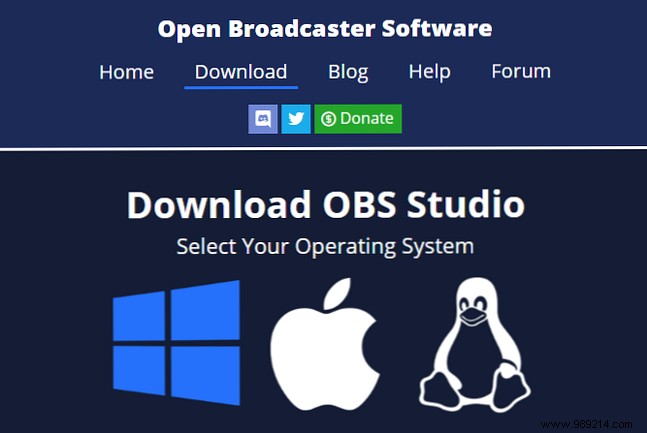
Step through the standard installer. Once complete, OBS Studio will offer to guide you through an automatic setup wizard. You can do this if you want; we will review the related settings below.
The main interface of OBS Studio allows you to configure everything you need to start streaming or recording. At the bottom of the screen, you'll see several control elements.
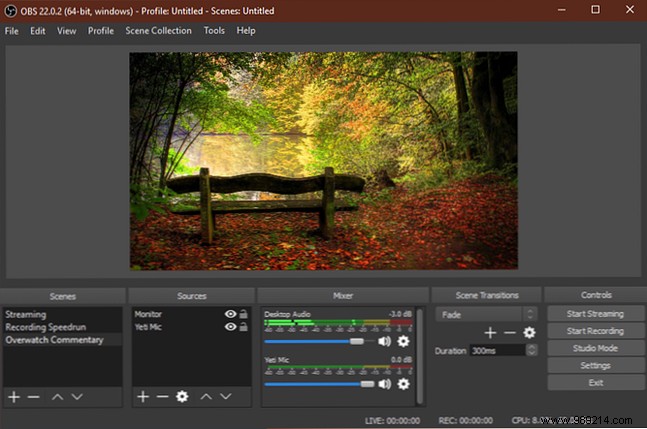
ONE Scene in OBS Studio allows you to collect and organize certain Source Items specifically. You can have multiple scenes and switch between them at will.
This will make a little more sense as we go along. For now, you can click the More Button to create a new scene. Call it Flaw or something similar (you can change it later).
Once you've added a few elements, you can click on them in the preview to adjust them however you like. Click on the Eye icon to hide an element, or the Lock to avoid accidental movements.
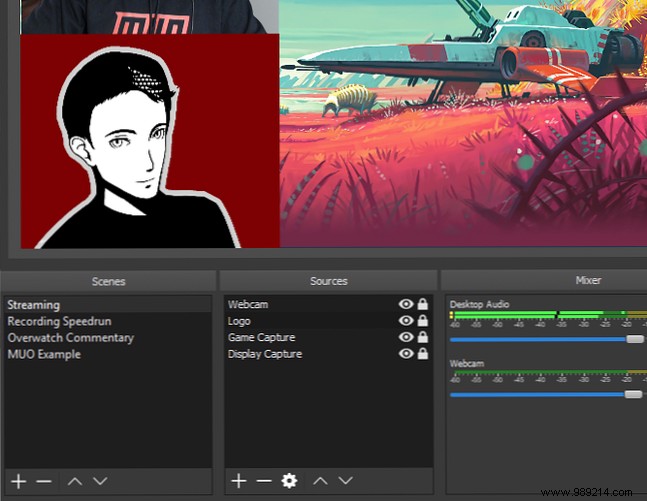
Fonts are the video and audio inputs that you bring into OBS Studio. Click the More button to add a new one, and you will see several categories. Some of the most important include:
Once you select an option, you can choose Create new or Add existing . Since you started, you will need to add a new item that you can reuse later. After clicking OK , OBS Studio displays options depending on the source you chose.
As an example, click Audio Input Capture . Let's say you're going to use a microphone with headphones to record audio. Enter a descriptive name for the source (such as Headset Microphone ) and click OK . On the resulting screen, choose your headset's microphone Device dropdown and click OK .
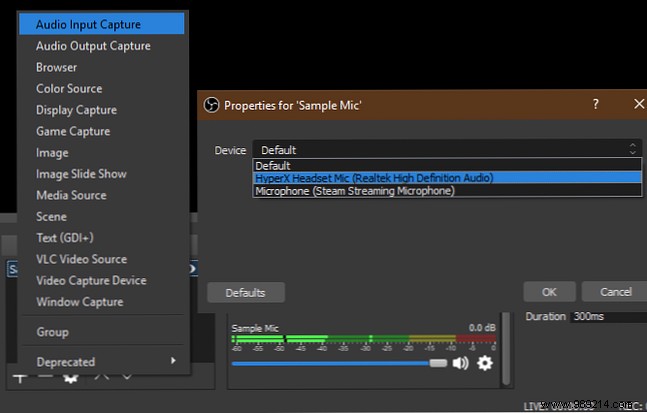
You now have that entry registered with OBS Studio and can easily add it back in the future. You'll need to repeat this step to add your webcam, screenshot, and the like.
Once you've added all your sources, the Mixer The tab allows you to adjust the volume balance between them. The bars move in real time to reflect the levels. Drag the slider to adjust the mix, or click the speaker icon to mute a source.
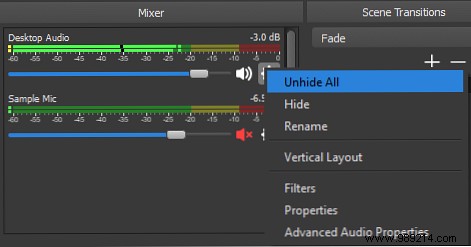
Play around with these ahead of time, as different sources can have wildly different volume levels. You don't want to complete a recording only to find that the game's audio overwhelms your microphone.
This simple section allows you to choose what happens when you swap scenes. Choose between Fade and Cut in the dropdown, or press More to choose another option. You can choose how long the transition lasts using the Duration box.
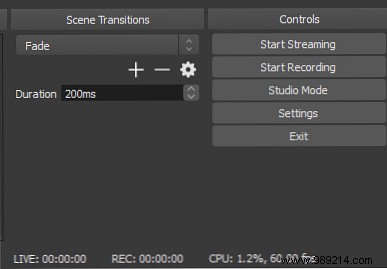
Here the Start broadcasting and Start recording The buttons will allow you to start capturing with OBS Studio. You can see the current FPS and CPU usage below.
It also allows you to enable Study mode to make changes to scenes on the fly, as well as access the many Settings from OBS Studio.
Before your first recording or streaming, you need to set a few options. Click Settings in the Controls Interface section to access them.
OBS Studio offers other options than the ones we explore here, but you shouldn't worry about them until you have more experience with them.
First, go to the Video tongue. Here, check the Base Resolution (Canvas) and Output resolution (scaling) options.
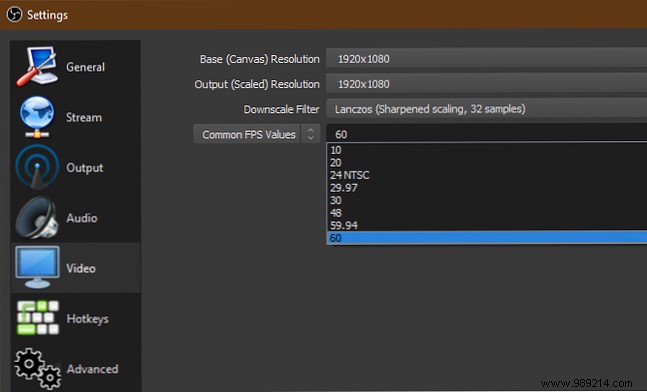
The former should match your screen resolution, while the latter allows you to choose the resolution of the final video. Exit Exit same as above for full quality recording, or lower it to something like 1280 × 720 for a smaller file size. Leave the Low Scale Filter like Spears if you are going down scale.
Finally here, you will have to choose the FPS (frames per second) of the recording. For a smooth image, choose 60 . But if you want a smaller file size or are recording something simple, 30 is adequate.
It is also a good idea to open the Advanced tab and set Priority process to High to give OBS Studio the most resources to create the best recording.
Switch to Output tab to access the recording screen options.
At the top, you can set the Output Mode to Simple or Advanced . If you want a fast and solid preset, choose Simple and set the following to Recording :
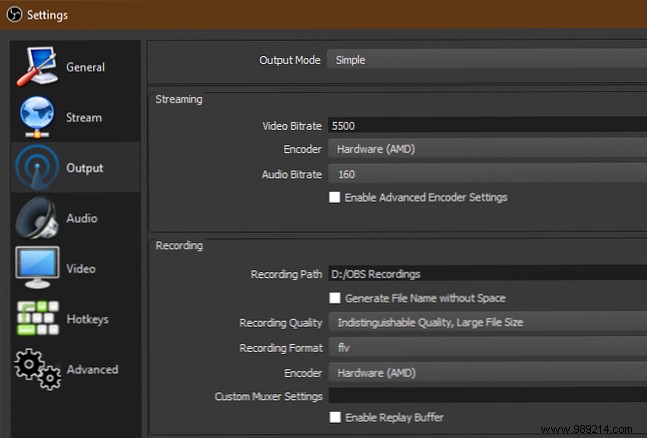
Of course, Advanced It gives you more options. Choose Advanced and switch to Recording tab below to see them.
Choose where you want your entire video to be saved using the Save Path field.
Under Recoding Format , Can you choose the video file type AVI, MKV or MP4? Video File Types Explained &Compared AVI, MKV or MP4? Video File Types Explained &Compared Why are there so many video formats? It's confusing! But don't worry, we are here to help you. Here you will find everything you need to know about video formats, containers and codecs. Read More Default is FLV , which is a default fine. Although MP4 is a popular format, using it is risky because you will lose the entire file if OBS Studio cannot finish it. So a blue screen or power outage would destroy an MP4 recording but just cut off an FLV.
Below this, you will need to choose an Encoder . Default is x264 , which uses your CPU. If you have a powerful dedicated graphics card (not integrated graphics) Integrated graphics card vs. Dedicated Card:7 Things You Need to Know Integrated and Dedicated Graphics Card:7 Things You Need to Know Wondering if you should use an integrated or dedicated graphics card? card? Here's what you need to know to make your decision. Read More (for AMD cards) or NVENC (for Nvidia cards). Doing so will probably provide better results when recording, since it won't put as much strain on your CPU.
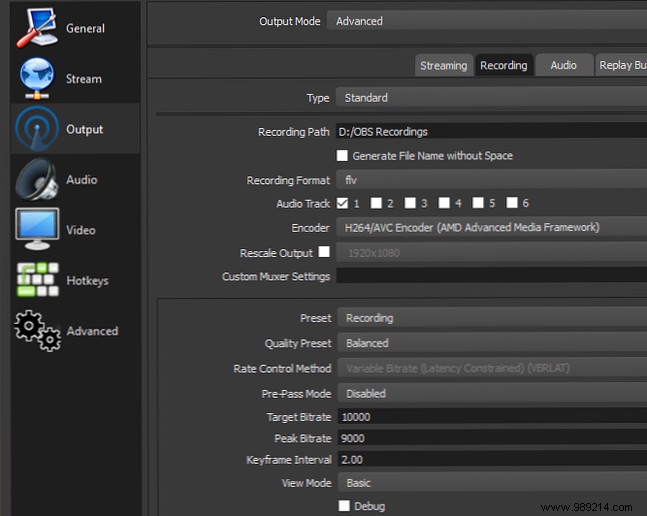
Feel free to try both and see which one is best for you.
Perhaps the most important part of your recording options is the Bitrate countryside. Essentially, a higher bitrate results in better quality videos with larger file sizes. Setting the bitrate too low will result in a pixelated video, while setting it too high will result in a massive file.
If you are using x264 , choose CBR (constant bitrate) and enter a value for bitrate down. 50,000 it's a good starting point for 1080p 60FPS recordings. The CPU Usage Preset allows you to adjust the amount of CPU the software uses to encode the video. Default is very fast , but you can upload this to super fast if you get a High CPU Usage Warning during recording or streaming.
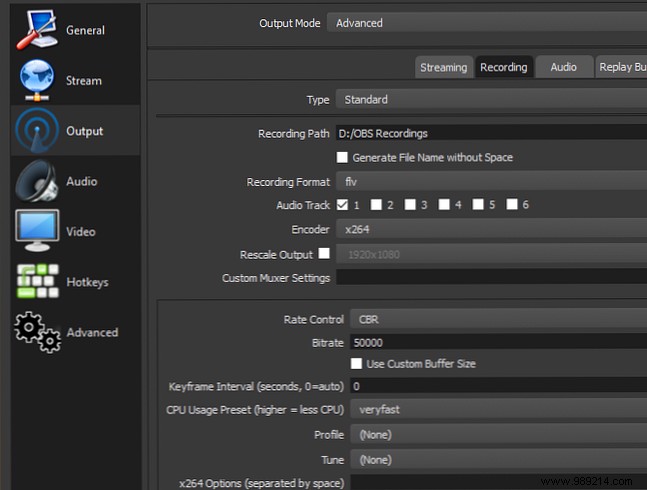
Those who use a graphics card encoder can choose a Schedule , or set the bitrate values below similar to above.
Try different values here with some test recordings to find the best balance between video quality and file size How to reduce video file size without losing quality How to reduce video file size without losing quality Is your video file taking up too much space? It's time to encode, compress and modify it so that it is reduced in size without losing any noticeable quality. Read More Record about a minute of typical footage and you can use that to estimate the size of a file you'll end up with.
You will find Transmission about the Departure tab too. In Simple In this mode, you simply need to specify a bitrate, choose between software or hardware encoding, and set the Audio Bitrate .
Twitch recommends some streaming bitrates based on quality. 1080p at 60fps should use a bitrate of at least 4,500, while 720p at 30fps can use something around 2,500. For audio bitrate, 160 It's a good baseline. You can increase this to 192 for better quality, or 320 If you need premium audio.
In the Advanced mode, you will find very similar options in the Broadcast tab as discussed above. You may want to lower the bitrate (as well as downscale the resolution and lower the FPS) slightly for streaming, as a stable stream that everyone can enjoy is better than the highest quality stream that few can enjoy .
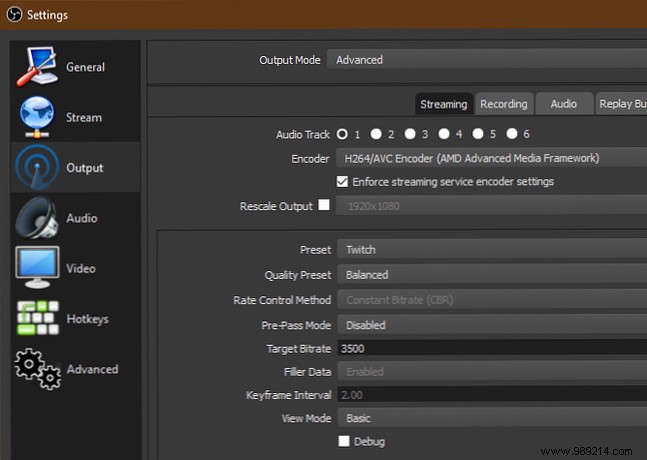
Tips to Fix Poor FPS in Games How to Fix Low Game FPS in Windows How to Fix Low Game FPS Windows frames per second (FPS) is to gaming what horsepower is to racing. We show you settings that will save you from low game FPS. Unleash the true power of your rig and watch your FPS soar! Read more apply too. Visit the Twitch streaming requirements page for more information.
To start the screen recording, all you have to do is click Start recording on the main page of OBS Studio. The software will start recording immediately based on the current scene. You can swap scenes at any time, so make sure you set them up beforehand.
When you click Stop recording , OBS Studio will save your file to the directory you specified in Settings . As mentioned above, we recommend doing a short test recording first to make sure everything looks and sounds acceptable.
To stream with OBS Studio, you will first need to authorize OBS Studio with your streaming account. Do this by opening Settings and changing to the Current tongue. Under Service , Choose your preferred service. You'll find Twitch, YouTube Games, Mixer and more.

Next, you will need to generate a streaming key for the service. To do this for Twitch, go to the Stream Key page in Twitch settings (Settings>Channel ) While connected. Click Copy and paste this into the Stream Key field in OBS Studio.
For YouTube Gaming, open the Live Stream> Stream Now tab in the YouTube studio builder. At the bottom of the page in the Encoder Settings section, reveal and copy your Sequence name/key .
Warning: Never give this stream key to anyone or show it in a stream! Anyone with access to this can stream to your account. If you accidentally share it, click Reset to generate a new one.
You now have a basic understanding of how to use OBS Studio. You can customize it a lot more to suit your personal needs, but this article is designed to get you ready to record gameplay locally or run your first stream.
Now you can focus on building an audience for your streams. 10 Tips to build an audience for your live stream. Channel 10 Tips for building an audience for your live broadcast. Starting a Twitch channel and wondering how to create an exciting stream? These tips will help you attract loyal and regular viewers and expand your audience. Read more.